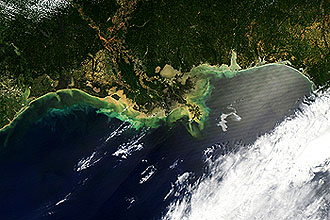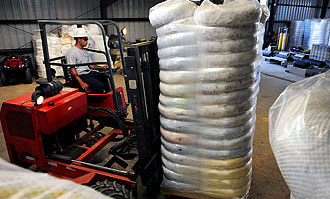Oil Leak Could Land Knockout Blow
On Friday (April 29), the National Guard was mobilized to help deal with an oil slick that began lapping onto the barrier islands off the coast of Louisiana. Those first oily waves mark the landfall of a massive oil leak that could cause the largest ecological disaster in the United States, eclipsing the Exxon Valdez spill in 1989.

Across the Gulf Coast, states are bracing for oil-laced tides from a massive underwater oil leak. (NASA satellite photo)
The oil leak could deal a devastating blow to sensitive ecosystems still struggling to recover from the effects of Hurricane Katrina, says Michael Blum, assistant professor of ecology and evolutionary biology.
"Think of the wetlands as a sponge," Blum says. "It's going to absorb the oil, and it can hold it, so there's the potential for long-term release."
An estimated 210,000 gallons of oil is spewing daily from the well 5,000 feet below the surface. Using the situation in Alaska following the Valdez spill as a frame of reference, Blum believes the prognosis is grim.
"If you reflect back on what happened in Alaska, that spill led to decades of exposure," Blum says. "Over that timeframe there will be a chronic exposure to oil, which is going to affect ecologically sensitive species like the brown pelican."

Preston Kott of U.S. Environmental Services moves oil-absorbent boom into a warehouse at a pollution control staging area in Venice, La. (U.S. Coast Guard photo by Petty Officer 3rd Class Patrick Kelley)
Blum says that a large proportion of the wildlife in the Gulf use Louisiana's coastal estuaries at some point in their lives, so any long-term impact could have a far-reaching consequences. The economic impact could be equally devastating, says Blum.
"A lot of people are talking about the oil spill as being a kind of one-two punch. Katrina hit the area really hard, and it's been recovering, but something like this will disrupt that trend."
Blum says the response needs to be rapid and well-coordinated if there is any hope to stem the oily tide.
"The preparedness factor is critical," Blum says. "It's going to be hard to coordinate people on the ground. Having the resources and the tools and expertise in the right place is going to be tough."
